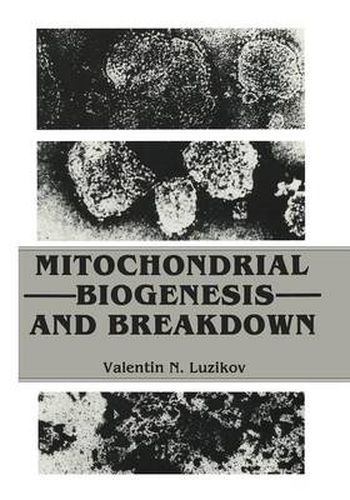Readings Newsletter
Become a Readings Member to make your shopping experience even easier.
Sign in or sign up for free!
You’re not far away from qualifying for FREE standard shipping within Australia
You’ve qualified for FREE standard shipping within Australia
The cart is loading…






This title is printed to order. This book may have been self-published. If so, we cannot guarantee the quality of the content. In the main most books will have gone through the editing process however some may not. We therefore suggest that you be aware of this before ordering this book. If in doubt check either the author or publisher’s details as we are unable to accept any returns unless they are faulty. Please contact us if you have any questions.
It is a strange fact that many modern cell biochemists have a keen interest in biosynthetic processes, such as protein and nucleic biosynthesis or organelle biogenesis, but tend to regard degradative processes merely as irritating reactions that disrupt the flow of synthetic reactions. Historically, the elucidation of catabolic pathways preceded that of anabolic pathways, so that there is also a tendency to regard work on proteases, phospholipases, nucleases, etc., as somewhat old-fashioned.
It is the great contribution of Professor Luzikov’s book to show that, at least in the case of mito- chondrial research, the separation of studies on anabolic and cata- bolic processes has been very harmful. In an extremely erudite and measured way, the author carefully develops the argument that we can only understand mitochondrial biogenesis fully if we take into account the role of degradative processes. The action of lytic enzymes is shown not to be a random affair, but rather a process that is fully integrated into the process of mitochondrial assembly. A second important contribution of this book is the fact that it contains a masterly review of the fundamental literature on mitochon- drial structure, function, breakdown and synthesis presented in an integrated and logical manner.
$9.00 standard shipping within Australia
FREE standard shipping within Australia for orders over $100.00
Express & International shipping calculated at checkout
This title is printed to order. This book may have been self-published. If so, we cannot guarantee the quality of the content. In the main most books will have gone through the editing process however some may not. We therefore suggest that you be aware of this before ordering this book. If in doubt check either the author or publisher’s details as we are unable to accept any returns unless they are faulty. Please contact us if you have any questions.
It is a strange fact that many modern cell biochemists have a keen interest in biosynthetic processes, such as protein and nucleic biosynthesis or organelle biogenesis, but tend to regard degradative processes merely as irritating reactions that disrupt the flow of synthetic reactions. Historically, the elucidation of catabolic pathways preceded that of anabolic pathways, so that there is also a tendency to regard work on proteases, phospholipases, nucleases, etc., as somewhat old-fashioned.
It is the great contribution of Professor Luzikov’s book to show that, at least in the case of mito- chondrial research, the separation of studies on anabolic and cata- bolic processes has been very harmful. In an extremely erudite and measured way, the author carefully develops the argument that we can only understand mitochondrial biogenesis fully if we take into account the role of degradative processes. The action of lytic enzymes is shown not to be a random affair, but rather a process that is fully integrated into the process of mitochondrial assembly. A second important contribution of this book is the fact that it contains a masterly review of the fundamental literature on mitochon- drial structure, function, breakdown and synthesis presented in an integrated and logical manner.